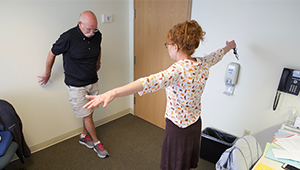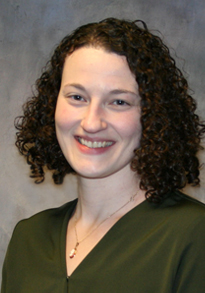Mikael Anne Greenwood-Hickman, MPH
Biography
Mikael Anne Greenwood-Hickman, MPH, brings a mixed methods approach to geriatrics and aging research. Through the application of both quantitative and qualitative methods, her work aims to better understand the lives and behavior of older adults in order to build interventions and tools to preserve cognitive and physical function and promote wellbeing.
Since completing her Master of Public Health in epidemiology at the University of Washington in 2014, Ms. Greenwood-Hickman has served in several roles within public health research teams, including as a data manager, programmer, and project manager. In 2021, Ms. Greenwood-Hickman formally joined the KPWHRI faculty as a collaborative scientist, bringing her operational knowledge and management skills to bear on her scientific portfolio.
Ms. Greenwood-Hickman’s research interests and work are primarily focused on understanding physical activity and sedentary behavior patterns among older adults and developing and testing interventions to promote physical activity and reduce sedentary time. She has been an active collaborator on the Adult Changes in Thought (ACT) Study’s Activity Monitoring sub-study since 2018. As part of this work, she has a particular interest in research that links data gathered by accelerometers (activity trackers that electronically detect up-and-down, side-to-side, and back-and-forth motion) to cognitive and physical function outcomes in later life. Her current work in ACT explores applications of the 24-hour activity cycle framework to the epidemiology of aging. Outside of ACT, Ms. Greenwood-Hickman leads accelerometer data collection and processing for ongoing intervention and observational studies using a variety of research and commercial accelerometers and platforms. She pairs this work with qualitative analysis efforts that seek to elucidate participants’ lived experience engaging in physical activity and sedentary behavior research and behavior change.
Areas of research focus
-
Aging & Geriatrics
-
Behavior Change
-
Obesity
-
Physical Activity/Sedentary Behavior
-
Built Environment
-
Chronic Illness Management
Recent Publications
Dublin S, Greenwood-Hickman MA, Karliner L, Hsu C, Coley RY, Colemon L, Carrasco A, King D, Grace A, Lee SJ, Walsh JME, Barrett T, Broussard J, Singh U, Idu A, Yaffe K, Boustani M, Barnes DE The electronic health record Risk of Alzheimer's and Dementia Assessment Rule (eRADAR) brain health trial: Protocol for an embedded, pragmatic clinical trial of a low-cost dementia detection algorithm 2023 Dec;135:107356. doi: 10.1016/j.cct.2023.107356. Epub 2023-10-17. PubMed
Hibbing PR, Carlson JA, Steel C, Greenwood-Hickman MA, Nakandala S, Jankowska MM, Bellettiere J, Zou J, LaCroix AZ, Kumar A, Katzmarzyk PT, Natarajan L Low movement, deep-learned sitting patterns, and sedentary behavior in the International Study of Childhood Obesity, Lifestyle and the Environment (ISCOLE) 2023 Nov;47(11):1100-1107. doi: 10.1038/s41366-023-01364-8. Epub 2023-08-14. PubMed
Wu Y, Rosenberg DE, Greenwood-Hickman MA, McCurry SM, Proust-Lima C, Nelson JC, Crane PK, LaCroix AZ, Larson EB, Shaw PA Analysis of the 24-h activity cycle: An illustration examining the association with cognitive function in the Adult Changes in Thought study 2023 Mar 27;14:1083344. doi: 10.3389/fpsyg.2023.1083344. Epub 2023-03-27. PubMed
Bellettiere J, Nakandala S, Tuz-Zahra F, Winkler EAH, Hibbing PR, Healy GN, Dunstan DW, Owen N, Greenwood-Hickman MA, Rosenberg DE, Zou J, Carlson JA, Di C, Dillon LW, Jankowska MM, LaCroix AZ, Ridgers ND, Zablocki R, Kumar A, Natarajan L CHAP-Adult: A Reliable and Valid Algorithm to Classify Sitting and Measure Sitting Patterns Using Data From Hip-Worn Accelerometers in Adults Aged 35 2022 Dec;5(4):215-223. doi: 10.1123/jmpb.2021-0062. Epub 2022-09-21. PubMed
Hyde ET, Nguyen S, Tuz-Zahra F, Moore CC, Greenwood-Hickman MA, Walker RL, Natarajan L, Rosenberg D, Bellettiere J Agreement of Step-Based Metrics From ActiGraph and ActivPAL Accelerometers Worn Concurrently Among Older Adults 2022 Dec;5(4):242-251. doi: 10.1123/jmpb.2022-0001. Epub 2022-10-11. PubMed
Healthy Findings Blog

Meet KPWHRI’s collaborative scientists
The division contributes to research across the institute with methodological and subject matter expertise.
New funding

Grant of over $55M to boost Alzheimer’s, dementia study
Kaiser Permanente Washington will co-lead an expanded ACT Program to better understand the aging brain.
Healthy Findings Blog

We decreased people’s daily sedentary time by an hour
Changing behavior isn’t easy, but Dr. Dori Rosenberg helped older people to stand and walk more.



